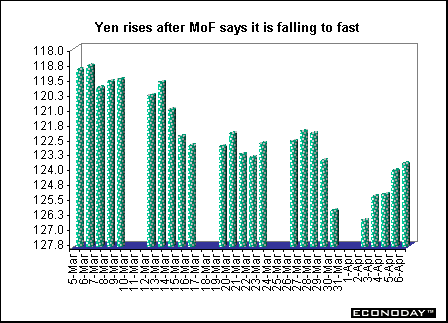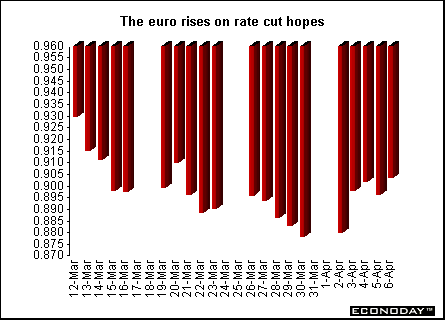
Currencies
The yen sank to a two and a half year low against the dollar after Japanese business confidence declined for the first time in more than two years, stoking new recessionary fears. The yen fell until officials indicated they would intervene if it fell too far, too fast. The yen obeyed and rose. The currency had fallen to its lowest level since October 7, 1998. The Bank of Japan's Tankan report showed that large manufacturers' confidence fell more than expected in the first quarter.

Some analysts think that a weaker yen would be the best option left to the Japanese policy makers to boost exports and growth. Still, concerns that the yen may fall too quickly and affect the stability of other Asian economies may prompt policy makers to consider buying the Japanese currency. The yen rose after comments by Japanese Ministry of Finance (MoF) officials suggested the government might buy yen to slow the currency's decline. Some traders are a bit skeptical, saying that it may be too coincidental that these comments came just before the April 7 and 8 meeting of the ten member Association of South East Asian Nations (ASEAN) finance ministers in Kuala Lumpur, Malaysia. The ASEAN group did issue a statement at the end of their meeting saying that the sinking yen has created uncertainty and instability in regional financial markets and could adversely affect the prospects for continued growth.
The euro is sidelined waiting for the ECB meeting on Wednesday. Despite the equities gyrations, the euro did its usual thing, went down when everyone thought theoretically that it should be rising. However, it did finish the week higher on the weak U.S. employment report and faltering equities markets. But the dollar maintained its strength against the euro because analysts and investors say that the Federal Reserve is more responsive to slowing growth than the European Central Bank.

A rate cut probably would boost the euro regardless of whether the economy actually needs it or not. It would be good psychologically for the ECB to be seen as doing something to foster growth - and something pro-active. In any case, expectations are high that the ECB will lower rates by at least 25 basis points. Unlike the U.S. Federal Reserve and the Bundesbank in days of old, the ECB seems to want to avoid telegraphing its moves ahead of time. The Bank still can't decide what to say about interest rates. So, officials have agreed to stick to a script. Policy makers are citing a statement saying the ECB wants more signs that inflation is under control before lowering borrowing costs. Few are buying the message.


Introduction • Global Stock Market Indexes • Recap of Global Markets • Currencies • Indicator Scoreboard

The Bottom Line • Looking Ahead
|